Critical Theory
Critical Theory

Le Corps Lesbien
"Pour Le Corps lesbien j’étais face à la nécessité d’écrire un livre entièrement lesbien dans sa thématique, son vocabulaire et sa texture, un livre lesbien du début à la fin, de la première à la quatrième de couverture. Je me trouvais par conséquent devant une double béance : celle de la page blanche que doivent affronter tous les écrivains lorsqu’ils commencent un livre, et une autre de nature différente : il n’existait aucun livre de ce genre. Jamais je n’ai relevé un défi aussi radical. Pouvais-je tenter cela ? En étais-je seulement capable ? Et quel serait alors ce livre ? J’ai gardé le manuscrit six mois dans un tiroir avant de le donner à mon éditeur."—Monique Wittig

Radical Futurisms – Ecologies of Collapse / Chronopolitics / Justice to Come
What comes after end-of-world narratives: visions of just futurity and multispecies flourishing.
There is widespread consensus that we are living at the end—of democracy, of liberalism, of capitalism, of a healthy planet, of the Holocene, of civilization as we know it. In this book, drawing on radical futurisms and visions of justice-to-come emerging from the traditions of the oppressed—Indigenous, African-American, multispecies, anti-capitalist—as materialized in experimental visual cultural, new media, aesthetic practices, and social movements, T. J. Demos poses speculative questions about what comes after end-of-world narratives. He argues that it's as vital to defeat fatalistic nihilism as it is to defeat the false solutions of green capitalism and algorithmic governance.
How might we decolonize the future, and cultivate an emancipated chronopolitics in relation to an undetermined not-yet? If we are to avoid climate emergency's cooptation by technofixes, and the defuturing of multitudes by xenophobic eco-fascism, Demos argues, we must cultivate visions of just futurity and multispecies flourishing.
-575f5a59fae756755c70e16a3f1db7f4.jpg)
The Black Atlantic
In this groundbreaking work, Paul Gilroy proposes that the modern black experience can not be defined solely as African, American, Carribean or British alone, but can only be understand as a Black Atlantic culture that transcends ethnicity or nationality. This culture is thorough modern and, often, overlooked but can deeply enriches our understanding of what it means to be modern.
This condition comes out of historical transoceanic experience, established first with the slave trade but later seen in the development of a transatlantic culture. And Gilroy takes us on a tour of the music that, for centuries, has transmitted racial messages and feeling around the world, from the Jubilee Singers in the nineteenth century to Jimi Hendrix to rap. He also explores this internationalism as it is manifested in black writing from the ‘double consciousness’ of W. E. B. Du Bois to the ‘double vision’ of Richard Wright to the compelling voice of Toni Morrison. As a consequence, Black Atlantic charts the formation of a nationalism, if not a nation, within this shared, disasporic culture.

Bad Education: Why Queer Theory Teaches Us Nothing
Long awaited after No Future, and making queer theory controversial again, Lee Edelman’s Bad Education proposes a queerness without positive identity—a queerness understood as a figural name for the void, itself unnamable, around which the social order takes shape.
Like Blackness, woman, incest, and sex, queerness, as Edelman explains it, designates the antagonism, the structuring negativity, preventing that order from achieving coherence. But when certain types of persons get read as literalizing queerness, the negation of their negativity can seem to resolve the social antagonism and totalize community.
By translating the nothing of queerness into the something of “the queer,” the order of meaning defends against the senselessness that undoes it, thus mirroring, Edelman argues, education’s response to queerness: its sublimation of irony into the meaningfulness of a world. Putting queerness in relation to Lacan’s “ab-sens” and in dialogue with feminist and Afropessimist thought, Edelman reads works by Shakespeare, Jacobs, Almodóvar, Lemmons, and Haneke, among others, to show why queer theory’s engagement with queerness necessarily results in a bad education that is destined to teach us nothing.

Let Them Rot: Antigone's Parallax
A provocative, highly accessible journey to the heart of Sophocles' Antigone elucidating why it keeps resurfacing as a central text of Western thought and Western culture.
"Zupančič writes with rare lucidity and patience for exposition, helped along by a talent for turning peculiar phrases or seemingly senseless jokes into full-blown insights. Her ideas are fresh, as if they hailed from some open air beyond the clutter of current theoretical quarrels. This brilliant account of Antigone breaks new ground for philosophy, psychoanalysis, and political and feminist theory."—Joan Copjec, Brown University
There is probably no classical text that has inspired more interpretation, critical attention, and creative response than Sophocles' A ntigone. What is it about the figure of Antigone that keeps haunting us? To what kind of always contemporary contradiction does the need, the urge to reread and reimagine Antigone—in all kinds of contexts and languages—correspond?
The violence in Antigone is the opposite of "graphic" as we have come to know it in movies and in the media; rather, it is sharp and piercing, it goes straight to the bone. It is the violence of language, the violence of principles, the violence of desire, the violence of subjectivity. From this question of violence, the author turns to questions of funerary rites and of the relation of Antigone's singularizing claims to her universal appeal. What, Zupančič asks, does this particular (Oedipal) family's misfortune, of which Antigone chooses to be the guardian, share with the general condition of humanity? This forces us to confront the seemingly self-evident question: "What is incest?"
Let Them Rot is Alenka Zupančič's absorbing guided tour of the philosophical and psychoanalytic issues arising from the Theban trilogy. Her original and surprising account illuminates the play's ongoing relevance and invites a wide readership to become captivated by its themes.
Alenka Zupančič is Professor of Philosophy and Psychoanalysis at the European Graduate School and a researcher at the Institute of Philosophy at the Slovene Academy of Sciences and Arts. Her books include What IS Sex?, The Odd One In: On Comedy, and Ethics of the Real.
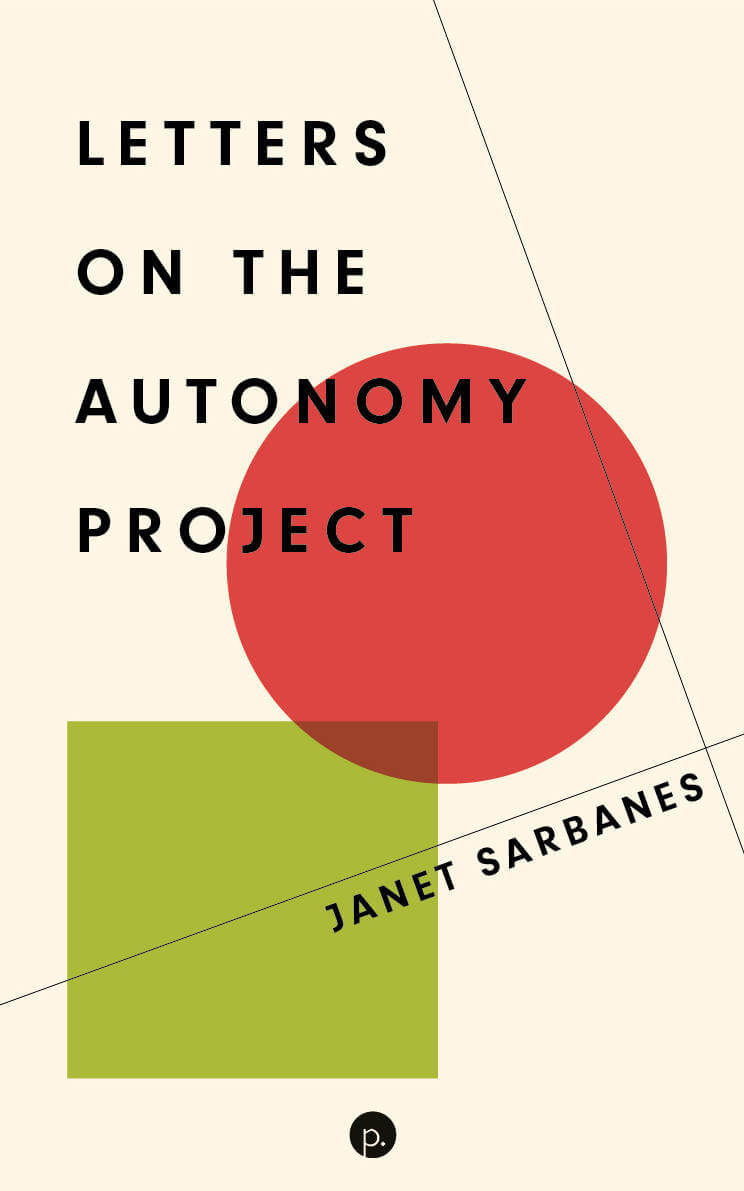
Letters on the Autonomy Project
In the face of rising authoritarianism and on the heels of urgent struggle, autonomy calls to us. How might we excavate the theory and history of autonomous politics to arrive at new possibilities for radical democracy and the radical imaginary? How can we rethink the ways in which artistic autonomy is theorized and practiced beyond the shrunken horizon of liberal individualism? How might we understand political and artistic autonomies as linked, rather than diametrically opposed? And what role does radical pedagogy have to play in all of this?
Framed by the thought of Cornelius Castoriadis, and engaging with Marxist, Black Radical, and Feminist approaches to liberation, as well as movements such as Occupy, Black Lives Matter, Me Too, Letters on the Autonomy Projectunderstands autonomy to be the capacity of a society, a community or an individual to modify its form. As Castoriadis argues, the struggle for self-determination requires unlimited questioning of the way things are, but also that we do or make something new in light of this interrogation. Autonomy is thus equally a project for thought, for education, for politics, and for art.
Stylistically, these open letters, addressed inclusively to artists, activists, and academics, are modeled on the philosophical letters of Friedrich Schiller on the one hand and the revolutionary communiqués of the Zapatistas on the other. Performing a kind of writing-as-praxis, they seek to grasp the potential of our moment with reference to historical and contemporary instances of political autonomy, notions of artistic autonomy, and art practices that connect the two. They also look at the possibilities of educating for autonomy, which cannot itself be taught. If we are indeed living in a time of creative struggle to remake the whole of society, then an understanding of the autonomy project – and how theory, pedagogy, activism, and art might contribute to it – is of burning relevance.
Janet Sarbanes is the author of the short story collections Army of One and The Protester Has Been Released.

In Pursuit of Revolutionary Love: Precarity, Power, Communities
Violence is arrayed against us because we’re Black, or female, or queer, or undocumented. There is no rescue team coming for us. With that knowledge, we need a different operational base to recreate the world. It is not going to be a celebrity savior. Never was, never will be. If you’re in a religious tradition that is millennia-old, consider how the last savior went out. It was always going to be bloody. It was always going to be traumatic. But there’s a beauty to facing the reality of our lives. Not our lives as they’re broken apart, written about, and then sold back to us in academic or celebrity discourse. But our lives as we understand them. The most important thing is showing up. Showing up and learning how to live by and with others, learning how to reinvent ourselves in this increasing wasteland. That’s the good life.
Foreword by Da’Shaun L. Harrison.
Afterword by Mumia Abu-Jamal.
"Joy James’s Revolutionary Love is umph-degree love; or love beyond measure. It is anything love. It is love without reckoning. It is love that dares all things, beyond which others may find the spirit-force to survive; to live to fight another day. Such love is also fighting itself, for the sake of ensuring that others may live." — Mumia Abu-Jamal
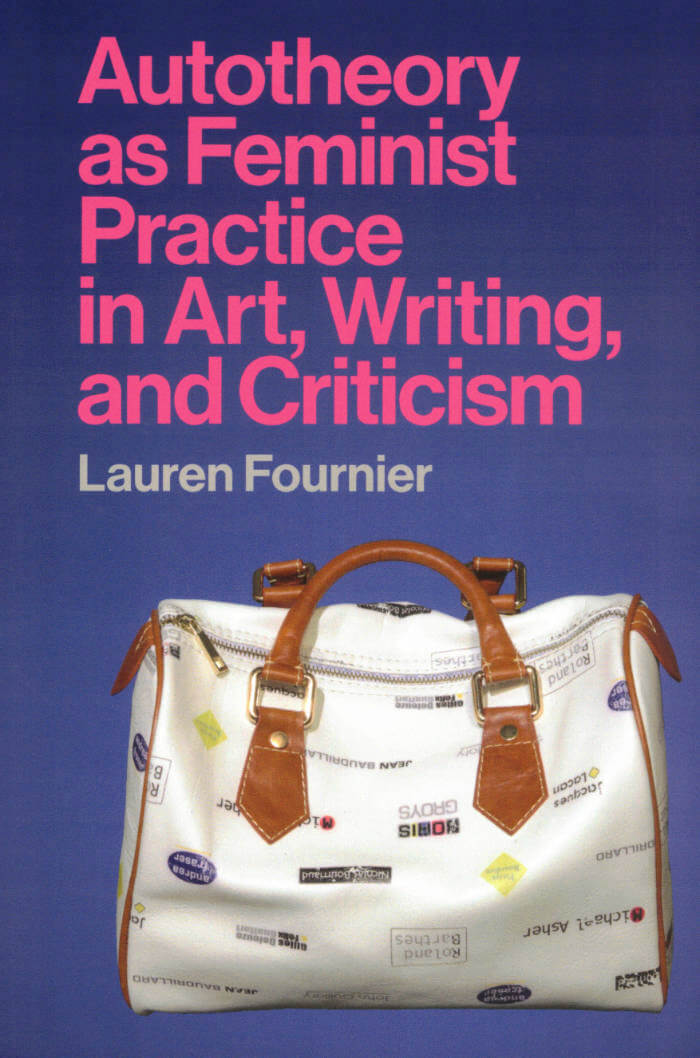
Autotheory as Feminist Practice in Art, Writing, and Criticism
Autotheory—the commingling of theory and philosophy with autobiography—as a mode of critical artistic practice indebted to feminist writing and activism.
In the 2010s, the term “autotheory” began to trend in literary spheres, where it was used to describe books in which memoir and autobiography fused with theory and philosophy. In this book, Lauren Fournier extends the meaning of the term, applying it to other disciplines and practices. Fournier provides a long-awaited account of autotheory, situating it as a mode of contemporary, post-1960s artistic practice that is indebted to feminist writing, art, and activism. Investigating a series of works by writers and artists including Chris Kraus and Adrian Piper, she considers the politics, aesthetics, and ethics of autotheory.
Fournier argues that the autotheoretical turn signals the tenuousness of illusory separations between art and life, theory and practice, work and the self—divisions long blurred by feminist artists and scholars. Autotheory challenges dominant approaches to philosophizing and theorizing while enabling new ways for artists and writers to reflect on their lives. She argues that Kraus's 1997 I Love Dick marked the emergence of a newly performative, post-memoir “I”; recasts Piper's 1971 performance work Food for the Spirit as autotheory; considers autotheory as critique; examines practices of citation in autotheoretical work, including Maggie Nelson's The Argonauts; and looks at the aesthetics and ethics of disclosure and exposure, exploring the nuanced feminist politics around autotheoretical practices and such movements as #MeToo. Fournier formulates autotheory as a reflexive movement, connecting thinking, making art, living, and theorizing.

Disidentifications: Queers of Color and the Performance of Politics
An important perspective on the ways outsiders negotiate mainstream culture.
There is more to identity than identifying with one’s culture or standing solidly against it. José Esteban Muñoz looks at how those outside the racial and sexual mainstream negotiate majority culture—not by aligning themselves with or against exclusionary works but rather by transforming these works for their own cultural purposes. Muñoz calls this process “disidentification,” and through a study of its workings, he develops a new perspective on minority performance, survival, and activism.
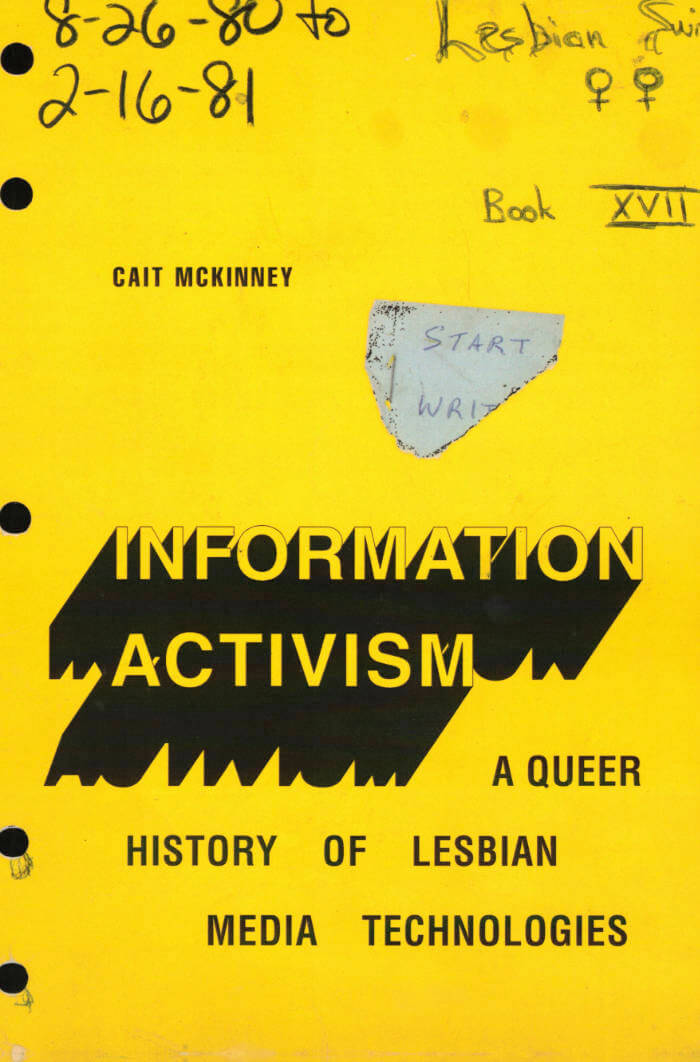
Information Activism: A Queer History of Lesbian Media Technologies
Cait McKinney traces how lesbian feminist activists in the United States and Canada between the 1970s and the present developed communication networks, databases, and digital archives to use as a foundation for their feminist, antiracist, and trans-inclusive work.
For decades, lesbian feminists across the United States and Canada have created information to build movements and survive in a world that doesn't want them.
In Information Activism Cait McKinney traces how these women developed communication networks, databases, and digital archives that formed the foundation for their work. Often learning on the fly and using everything from index cards to computers, these activists brought people and their visions of justice together to organize, store, and provide access to information.
Focusing on the transition from paper to digital-based archival techniques from the 1970s to the present, McKinney shows how media technologies animate the collective and unspectacular labor that sustains social movements, including their antiracist and trans-inclusive endeavors. By bringing sexuality studies to bear on media history, McKinney demonstrates how groups with precarious access to control over information create their own innovative and resourceful techniques for generating and sharing knowledge.

Disorganisation & Sex
Never does the patient seem more ill than when they try to order associations into a logical tale. Classical analysis sees this in terms of a repudiation of sexuality: an attempt to avoid speaking from a place of desire. But why should psychoanalysis reduce everything to sex? If sex only ever achieves partial satisfactions, fragments of pleasure, its pursuit creates our subjectivity and our world.
Disorganisation & Sex argues that the sexuality of psychoanalysis is not a reductive biologism, but an archaic remainder that cannot be colonised, endlessly disorienting meaning in our everyday lives. It is our proximity to this terrain that undoes our most tedious habits, and opens onto something revelatory.
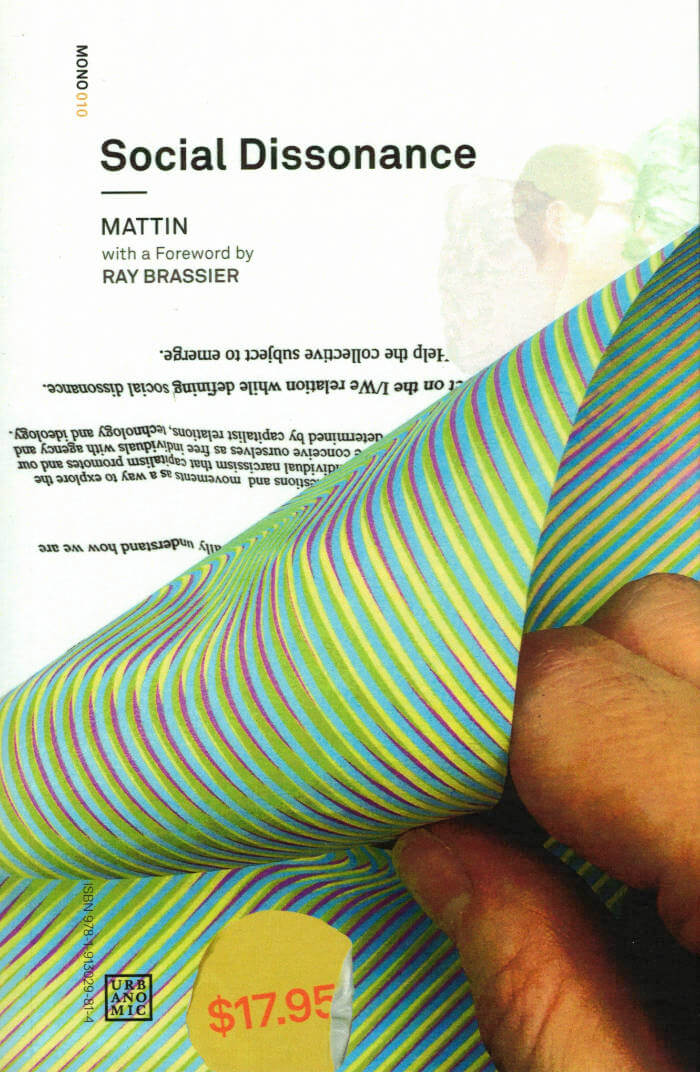
Social Dissonance
An argument that by amplifying alienation in performance, we can shift the emphasis from the sonic to the social.
Works in sound studies continue to seek out sound "itself" — but, today, when the aesthetic can claim no autonomy and the agency of both artist and audience is socially constituted, why not explore the social mediation already present within our experience of the sonorous? In this work, artist, musician, performer, and theorist Mattin sets out an understanding of alienation as a constitutive part of subjectivity and as an enabling condition for exploring social dissonance — the discrepancy between our individual narcissism and our social capacity.
Mattin's theoretical investigation is intertwined with documentation of a concrete experiment in the form of an instructional score (performed at documenta 14, 2017, in Athens and Kassel) which explores these conceptual connotations in practice, as players use members of the audience as instruments, who then hear themselves and reflect on their own conception and self-presentation. Social Dissonance claims that, by amplifying alienation in performance and participation in order to understand how we are constructed through various forms of mediation, we can shift the emphasis from the sonic to the social, and in doing so, discover for ourselves that social dissonance is the territory within which we already find ourselves, the condition we inhabit.

Borderlands / La Frontera: The New Mestiza 5th Edition
A new edition of Anzaldúa's classic text.
Borderlands/La Frontera: The New Mestiza is a 1987 semi-autobiographical work by Gloria E. Anzaldúa that examines the Chicano and Latino experience through the lens of issues such as gender, identity, race, and colonialism. Borderlands is considered to be Anzaldúa’s most well-known work and a pioneering piece of Chicana literature.
Rooted in Gloria Anzaldúa's experience as a Chicana, a lesbian, an activist, and a writer, the essays and poems in Borderlands/La Frontera: The New Mestiza profoundly challenged, and continue to challenge, how we think about identity. Borderlands/La Frontera remaps our understanding of what a border' is, presenting it not as a simple divide between here and there, us and them, but as a psychic, social, and cultural terrain that we inhabit, and that inhabits all of us.

Unpayable Debt
An examination of the relationship between coloniality, raciality, and global capital through a black feminist poethical framework, inspired by Octavia E. Butler's sci-fi novel Kindred (first volume in the On the Antipolitical series).
Unpayable Debt examines the relationship between coloniality, raciality, and global capital through a black feminist poethical framework. Inspired by Octavia E. Butler's 1979 sci-fi novel Kindred, in which an African American writer is transported back in time to the antebellum South to save her owner-ancestor, Unpayable Debt relates the notion of value to coloniality—both economic and ethical. Focusing on the philosophy behind value, Denise Ferreira da Silva exposes capital as the juridical architecture and ethical grammar of the world. Here, raciality—a symbol of coloniality—justifies deployments of total violence to enable expropriation and land extraction.
First volume in the On the Antipolitical series, edited by Ana Teixeira Pinto, devoted to the historical study of the depoliticization process, situating it within the neocolonialcontinuum that animates the digital frontier as the new locus of settler becoming.
Dr. Denise Ferreira da Silva's academic writings and artistic practice address the ethical questions of the global present and target the metaphysical and ontoepistemological dimensions of modern thought. Currently, she is a Professor and Director of The Social Justice Institute (the Institute for Gender, Race, Sexuality, and Social Justice) at the University of British Columbia.
Edited by Ana Teixeira Pinto.

Hatred of Sex
Hatred of Sex links Jacques Rancière's political philosophy of the constitutive disorder of democracy with Jean Laplanche's identification of a fundamental perturbation at the heart of human sexuality. Sex is hated as well as desired, Oliver Davis and Tim Dean contend, because sexual intensity impedes coherent selfhood and undermines identity, rendering us all a little more deplorable than we might wish. Davis and Dean explore the consequences of this conflicted dynamic across a range of fields and institutions, including queer studies, attachment theory, the #MeToo movement, and "traumatology," demonstrating how hatred of sex has been optimized and exploited by neoliberalism.
Advancing strong claims about sex, pleasure, power, intersectionality, therapy, and governance, Davis and Dean shed new light on enduring questions of equality at a historical moment when democracy appears ever more precarious.

K-Punk: The Collected and Unpublished Writings of Mark Fisher
A comprehensive collection of the writings of Mark Fisher (1968-2017), whose work defined critical writing for a generation.
This collection brings together the work of acclaimed blogger, writer, political activist and lecturer Mark Fisher (aka k-punk). Covering the period 2004 - 2016, the collection will include some of the best writings from his seminal blog k-punk; a selection of his brilliantly insightful film, television and music reviews; his key writings on politics, activism, precarity, hauntology, mental health and popular modernism for numerous websites and magazines; his final unfinished introduction to his planned work on Acid Communism; and a number of important interviews from the last decade.
Edited by Darren Ambrose and with a foreword by Simon Reynolds.
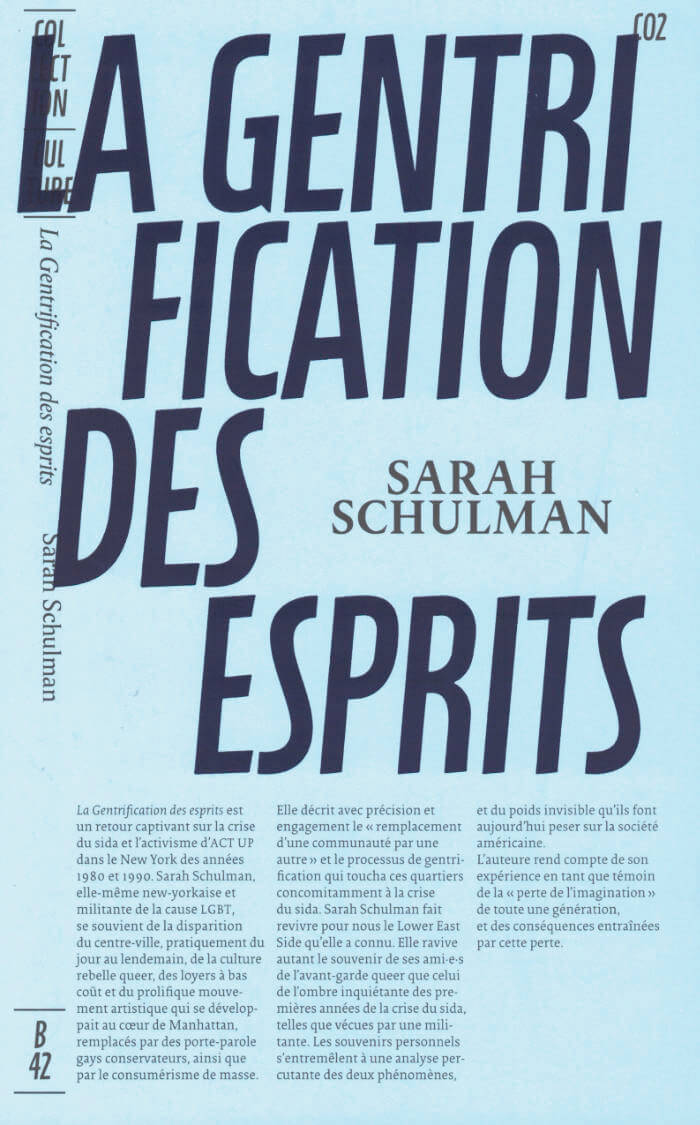
La Gentrification des Esprits
La Gentrification des esprits est un retour captivant sur la crise du sida et l’activisme d’ACT UP dans le New York des années 1980 et 1990. Sarah Schulman, elle-même new-yorkaise et militante de la cause LGBT, se souvient de la disparition du centre-ville, pratiquement du jour au lendemain, de la culture rebelle queer, des loyers à bas coût et du prolifique mouvement artistique qui se développait au coeur de Manhattan, remplacés par des porte-parole gays conservateurs, ainsi que par le consumérisme de masse.
Elle décrit avec précision et engagement le « remplacement d’une communauté par une autre » et le processus de gentrification qui toucha ces quartiers concomitamment à la crise du sida. Sarah Schulman fait revivre pour nous le Lower East Side qu’elle a connu. Elle ravive autant le souvenir de ses ami•e•s de l’avant-garde queer que celui de l’ombre inquiétante des premières années de la crise du sida, telles que vécues par une militante. Les souvenirs personnels s’entremêlent à une analyse percutante des deux phénomènes, et du poids invisible qu’ils font aujourd’hui peser sur la société américaine.
L’auteure rend compte de son expérience en tant que témoin de la « perte de l’imagination » de toute une génération, et des conséquences entraînées par cette perte.
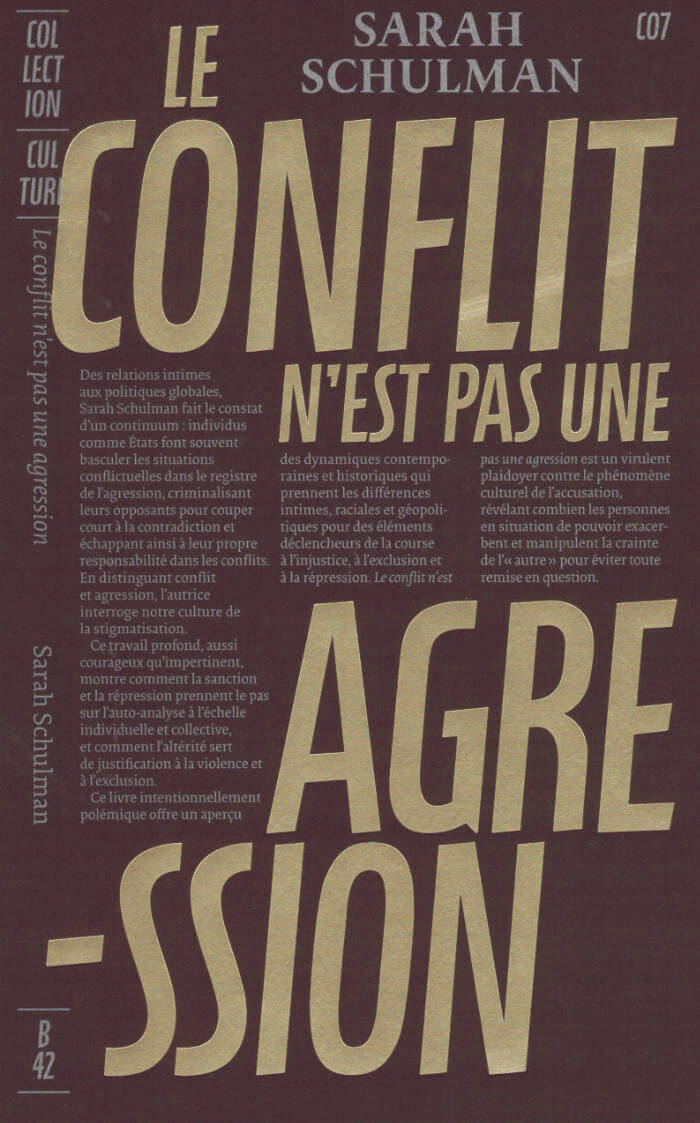
Le conflit n’est pas une agression
Des relations intimes aux politiques globales, Sarah Schulman fait le constat d’un continuum: individus comme États font souvent basculer les situations conflictuelles dans le registre de l’agression, criminalisant leurs opposants pour couper court à la contradiction et échappant ainsi à leur propre responsabilité dans les conflits. En distinguant conflit et agression, l’autrice interroge notre culture de la stigmatisation.
Ce travail profond, aussi courageux qu’impertinent, montre comment la sanction et la répression prennent le pas sur l’auto-analyse à l’échelle individuelle et collective, et comment l’altérité sert de justification à la violence et à l’exclusion. Ce livre intentionnellement polémique offre un aperçu des dynamiques contemporaines et historiques qui prennent les différences intimes, raciales et géopolitiques pour des éléments déclencheurs de la course à l’injustice, à l’exclusion et à la répression.
Le conflit n’est pas une agression est un virulent plaidoyer contre le phénomène culturel de l’accusation, révélant combien les personnes en situation de pouvoir exacerbent et manipulent la crainte de l’« autre » pour éviter toute remise en question.

Mon musée de la Cocaïne
L’or et la cocaïne sont les deux matériaux bruts de Mon musée de la Cocaïne. C’est au cours de leur transformation et raffinement que ces deux substances ramènent avec elles une histoire de l’oppression et de l’esclavage.
Dans ce livre, l’anthropologue australien Michael Taussig prend comme point de départ la proposition de bâtir un musée de la Cocaïne (qui serait l’image reflétée du musée de l’Or de la Banque de la République à Bogotá) et dresse un portrait sans concession de la vie des mineurs afro-colombiens aspirés dans le monde dangereux de la production de cocaïne au fin fond de la forêt tropicale, sur la côte pacifique de la Colombie. Il décrit la violence, la pauvreté, mais aussi les croyances qui surgissent des marais envahis de mangroves et des rivières tropicales qui, pendant plus de cinq cent ans, ont attiré, ruiné et décontenancé Amérindiens, orpailleurs, conquistadors et pirates, esclaves africains, ingénieurs russes et guérilleros marxistes.
Mon musée de la Cocaïne se présente comme un assemblage éclectique d’histoires et d’anecdotes, présenté comme autant de salles d’un hypothétique musée de la Cocaïne, au sein desquelles le lecteur est invité à déambuler, en croisant des références qui vont de Charles Dickens à Franz Kafka en passant par la poésie de Seamus Heaney.

Mélancolie Postcoloniale
Dans cet essai au verbe acéré, Paul Gilroy dénonce la pathologie néo-impérialiste des politiques mises en œuvre dans les pays occidentaux, sclérosés par les débats sur l’immigration, et propose en retour un modèle de société multiculturelle. De la création du concept de « race » à la formation des empires coloniaux, le sociologue britannique soulève quelques grandes questions de notre époque, et vise à faire émerger une réelle alternative aux récits édulcorés de notre passé colonial. En choisissant de mettre en avant la convivialité et le multiculturalisme indiscipliné du centre des grandes métropoles, Paul Gilroy défend une vision cosmopolite inclusive et plaide pour l’avènement d’une société qui refuse de céder aux discours de la peur et à la violence.
En examinant l’invention de catégories hiérarchisantes fondées sur la notion de race, et ses terribles conséquences, il démontre comment les écrits de penseurs tels que Frantz Fanon, W. E. B. Du Bois ou George Orwell peuvent encore faire avancer les réflexions sur le nationalisme, le postcolonialisme et les questions raciales. Mélancolie postcoloniale fait écho aux luttes postcoloniales d’aujourd’hui, en quête d’une pensée critique exigeante.

Palma Africana
Dans Palma africana, l’anthropologue australien Michael Taussig explore la production d’huile de palme en Colombie. Alors que cette dernière envahit tout, des chips au vernis à ongles, l’auteur examine les conséquences écologiques, politiques et sociales de cette exploitation.
Bien que la liste des horreurs induites par la culture du palmier à huile soit longue, nos terminologies habituelles ne permettent plus de rendre compte des réalités qu’elles décrivent. À travers cette déambulation anthropo-poétique au cœur des marécages colombiens, c’est donc la question du langage que l’auteur interroge. Comme William Burroughs, pour qui les mots sont aussi vivants que des animaux et n’aiment pas être maintenus en pages – Michael Taussig souhaite couper ces dernières, et les rendre à leur liberté.
Pensé à partir d’une vie d’exploration philosophique et ethnographique, Palma africana cherche à contrecarrer la banalité de la destruction du monde et offre une vision pénétrante de notre condition humaine. Illustré de photographies prises par l’auteur et écrit avec la verve expérimentale propre à l’anthropologue, ce livre est le Tristes Tropiques de Michael Taussig pour le XXIe siècle.
Traduit de l’anglais par Marc Saint-Upéry.
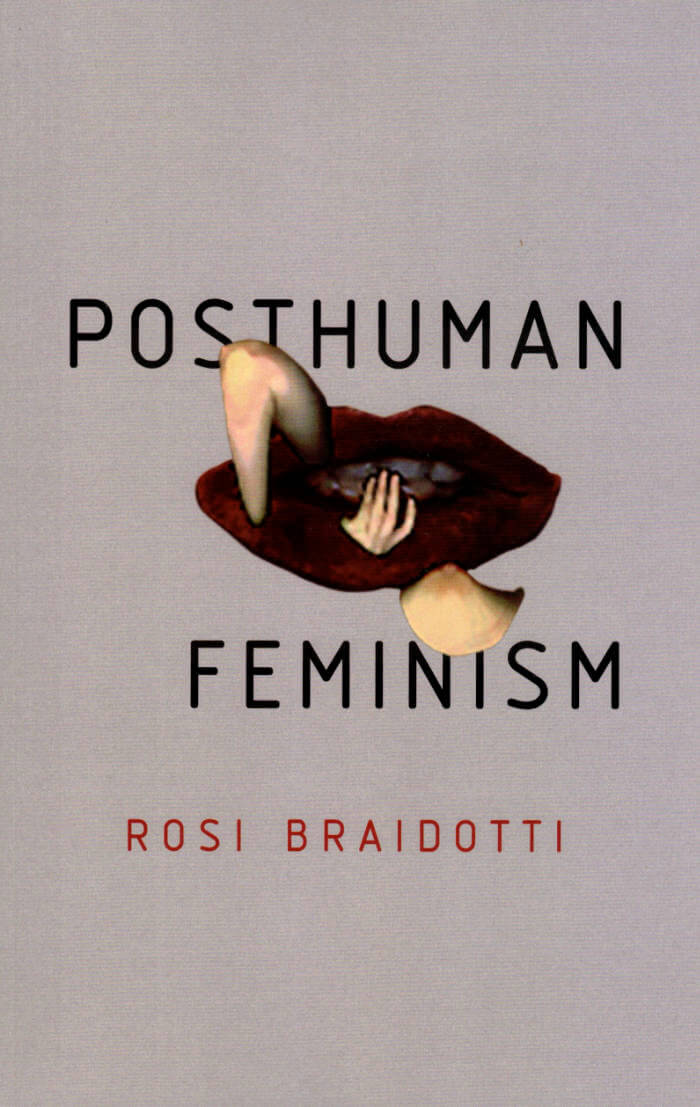
Posthuman Feminism
In a context marked by the virulent return of patriarchal and white supremacist attitudes, a new generation of feminist activists are continuing the struggle: these are very feminist times. But how do these and other movements relate to the contemporary posthuman condition?
In this important new book, Rosi Braidotti examines the implications of the posthuman turn for feminist theory and practice. She defines the posthuman turn as a convergence between posthumanism on the one hand and post-anthropocentrism on the other, and she examines their complex relationship and joint impact. Braidotti claims that mainstream posthuman scholarship has neglected feminist theory, while in fact feminism is one of the precursors of the posthuman turn, through diverse social movements and political traditions. Posthuman Feminism is an analytic and creative response to contemporary conditions and a call to action. It highlights the constraints but also the potentialities available to feminist political subjects as they confront the ever-growing injustices of sexism, racism, ecocide and neoliberal capitalism.
This bold new text by a leading feminist philosopher will be of great interest to students and scholars throughout the humanities and social sciences.

Ce que Sylvère Lotringer n'écrivait pas
François Piron, François Aubart and 1 more
A book of interviews with Sylvère Lotringer.
French philosopher Sylvère Lotringer (1938-2021) was the general editor of Semiotext(e). A younger contemporary of Gilles Deleuze, Félix Guattari, Jean Baudrillard, Paul Virilio and Michel Foucault, he was one of the main introducers and interpreters of French Theory in the United States. He is the author of Overexposed: Perverting Perversions (Semiotext(e), 2007).
François Aubart is an art critic, independent curator and publisher (co-founder of <o> future <o> and Même pas l'hiver).
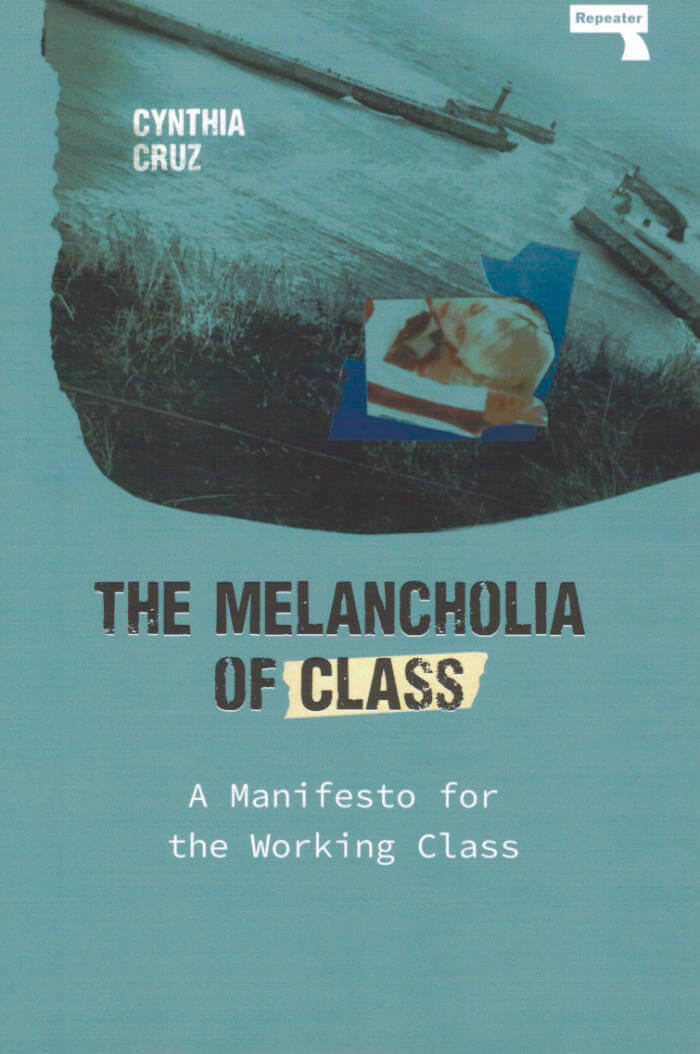
The Melancholia of Class: A Manifesto for the Working Class
In The Melancholia of Class, Cynthia Cruz analyses how this choice between assimilation or annihilation has played out in the lives of working-class musicians, artists, writers, and filmmakers — including Amy Winehouse, Ian Curtis, Jason Molina, Barbara Loden, and many more — and the resultant Freudian melancholia that ensues when the working-class subject leaves their origins to "become someone," only to find that they lose themselves in the process.
Part memoir, part cultural theory, and part polemic, The Melancholia of Class shows us how we can resist assimilation, uplifting and carrying our working-class origins and communities with us, as we break the barriers of the middle-class world. There are so many of us, all of us waiting. If we came together, who knows what we could do.
Cynthia Cruz is the author of six collections of poems: Dregs, How the End Begins, Wunderkammer, The Glimmering Room, Ruin, and Guidebooks for the Dead. Disquieting: Essays on Silence, a collection of critical essays on marginalization and silence, was published by Book*hug in 2019. Her first work of fiction, a novella, Steady Diet of Nothing, is forthcoming. She teaches at the City College of New York and in the MFA Writing Program at Columbia University.
Published 2021